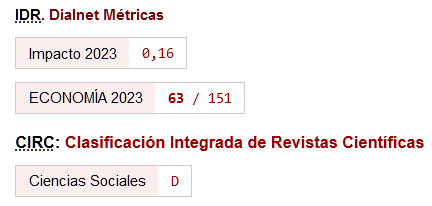Política de empleo comunitaria, políticas macroeconómicas y la Cumbre de Lisboa: un balance preliminar
Keywords:
EU employment policy, EU macroeconomic policies, neo-liberal policiesAbstract
The present article deals with the neo-liberal rationale behind employment and macroeconomic policies in the European Union. First, employment policies are considered to be designed to back compa nies interests (higher labour market flexibility, control of wage rises, cutting off corporate taxes) whilst they do not tackle dualism and precarisation. Moreover, the focus on information and communication technologies to foster employment is by no means proven to have had successful results in terms of job creation. Second, macroeconomic policies can be summarised by the aim to control inflation and public deficits, foster privatization and deregulating markets. Therefore, it can be stated that the clearly restrictive orientation of EU macroeconomic policies has result edin a completely detachment of these policies from the economic and social aim of employment creation.
Downloads
References
BANCO DE ESPAÑA (2000): "Las operaciones principales de financiación del eurosistema: las razones del cambio a un sistema de subastas a tipo variable". Boletín Económico (Junio 2000): 1-9.
COMISIÓN EUROPEA (2000): Comunicación de la Comisión. Estrategias para la creación de empleo en la sociedad de la información. Bruselas.
COMISIÓN EUROPEA (2001a): A Sustainable Europe for a Better World: A European Union Strategy for Sustainable Development. Bruselas.
COMISIÓN EUROPEA (2001b): Propuesta de Decisión del Consejo relativa a las directrices para las políticas de empleo de los Estados miembros para el año 2002. Bruselas.
COMISIÓN EUROPEA: Dirección General de Asuntos Económicos y Financieros (1998). Économie Européenne (65).
COMISIÓN EUROPEA: Dirección General de Empleo y Asuntos Sociales (2001). Employment in Europe 2001. Recent Trends and Prospects. Bruselas.
COMUNITATS EUROPEES (1998): Tractat de la Unió Europea. Textos consolidats dels Tractats constitutius e les Comunitats Europees. Bruselas, OPOCE.
CONSEJO EUROPEO (1997): Conclusiones de la Presidencia. Consejo Europeo de Luxemburgo, 12-13 Diciembre de 1997. Bruselas.
CONSEJO EUROPEO (2000): Conclusiones de la Presidencia. Consejo Europeo de Lisboa, 23-24 Marzo de 2000. Bruselas.
CONSEJO EUROPEO (2001): Recomendación del Consejo de 15 de Junio de 2001 relativa a las Orientaciones Generales de las Políticas Económicas de los Estados miembros y la Comunidad. Bruselas.
EUROPEAN CENTRAL BANK (1999a): "The stability-oriented monetary policy strategy of the Eurosystem." ECB Monthly Bulletin (January 1999): 39-50.
EUROPEAN CENTRAL BANK (1999b): "The operational framework of the Eurosystem: description and first assessment." ECB Monthly Bulletin (May 1999): 29-43.
EUROPEAN CENTRAL BANK (2000): "The single monetary policy in Stage Three: General documentation on Eurosystem monetary policy instruments and procedures".
EUROPEAN ECONOMISTS FOR AN ALTERNATIVE ECONOMIC POLICY IN EUROPE (2001). Economic Policy against Recessions in Europe! Proposals to overcome ideological sterility and policy blockades.
ROBERTO GONZÁLEZ IBÁN (2000): "Política fiscal del euro y el Pacto de Estabilidad y Crecimiento." Información Comercial Española (marzo-abril 2000): 75-81.
GLORIA HERNÁNDEZ GARCÍA Y FRANCISCO J. GARZÓN MORALES (2000): "Coordinación de políticas económicas en la UEM." Información Comercial Española (Marzo-Abril 2000): 13-21.
AGUSTÍN MORÁN (2001): "Globalització, moneda única, treball escombraria." Emergències (1): 47-66.
JOSEP M. MUNTANER-I-PASQUAL (2001): Els falcons de Frankfurt. El BCE hauria d'esmenar l'estatut fundacional per fer front a la recessió. AVUI. Barcelona.
RAFAEL MUÑOZ DE BUSTILLO Y RAFAEL BONETE (1997/2000): Introducción a la Unión Europea: un análisis desde la economía. Madrid, Alianza Editorial.
ANDY ROBINSON (2002): Los Quince discuten en Burgos cómo combinar pleno empleo y cohesión social. La Vanguardia. Barcelona: 81.
SERVEI D'ESTUDIS DE LA CAIXA "TIPUS D'INTERÈS I DE CANVI": Informe Mensual LaCaixa.
Downloads
Published
How to Cite
Issue
Section
License
This licence allows third parties to share (copy and redistribute the material in any medium or format) and adapt (remix, transform and create from the material for any purpose, including commercial purposes), provided that authorship and first publication in this journal (The Journal, DOI of the work) is acknowledged, a link to the licence is provided, and it is stated whether changes have been made to the work.







